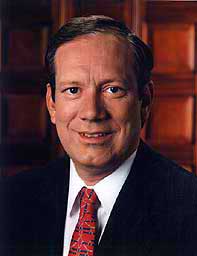-
- N.Y.C. health authorities find rare drug-resistant form of HIV that rapidly progressed to AIDS
- Massachusetts attorney general now says he backs same-sex marriage
- Survey: Many school counselors not trained to help gay students
- Opponents and supporters of same-sex marriage in New York pin their hopes on state’s top court
- San Francisco mayor defends his order to issue marriage licenses to same-sex couples
- Marine recruiter tries to explain ‘Don’t Ask, Don’t Tell’ policy
- National News Briefs
- World News Briefs
national
Opponents and supporters of same-sex marriage in New York pin their hopes on state’s top court
Justices decline to say if they will take case right away
Published Thursday, 17-Feb-2005 in issue 895
ALBANY, N.Y. (AP) – The court that could ultimately decide whether same-sex marriages are legal in New York may be dominated by Gov. George Pataki’s nominees, but that may give him little comfort.
The Court of Appeals’ two most significant rulings in the last 18 months were both major defeats for Pataki, a moderate Republican who is adamantly opposed to same-sex marriage.
He’s seen the high court effectively invalidate the death penalty that Pataki promised to reinstate when he beat Democrat Mario Cuomo in 1994. In the second ruling, the state was ordered to pour billions of dollars more into New York City schools.
“It’s difficult to handicap the court,” said Larry Moss, an expert on New York marriage law. “The result is unpredictable and anyone who tries to tell you that they know what the Court of Appeals is going to do is not being very helpful.”
The court’s next potential flashpoint in this largely Democratic state could be same-sex marriage – an issue that might arrive at the courthouse steps from two directions.
New York City lawyers will ask the Court of Appeals to take a direct appeal of a state Supreme Court ruling that said five same-sex couples can marry in New York. If the court accepts, the case will skip the midlevel Appellate Division of state Supreme Court, speeding a final ruling by several months.
Chief Court of Appeals’ Judge Judith Kaye declined to say if the court will take the case right away. The court is also being asked to do the same thing in an Albany case in which same-sex marriages were ruled illegal.
“I expect someday the issue will come to us, whether in this case or another case,” Kaye said.
The court has ruled favorably on other issues involving gay rights, including decriminalizing acts formerly defined as sodomy among consenting adults in 1980 and ruling that the domestic partner of a gay parent could legally become an adoptive parent of their partner’s child in 1995.
And in 1998, the court said that the life partner of the occupant of a rent-controlled apartment in New York City could continue to hold that dwelling because they had a long-term relationship “characterized by an emotional and financial commitment.”
“New York does by now have a very substantial track record of recognizing same-sex relationships,” said Jay Weiner, a New York City lawyer who was lead author of a 2001 New York City Bar Association report that concluded same-sex marriages in the state are legal.
The current court has three holdovers picked by the liberal Cuomo, including Kaye, and four justices selected by Pataki. All were confirmed by the Republican-controlled state Senate. The three Cuomo selections are seen as comprising a liberal-to-moderate bloc while the four Pataki judges swing in the moderate-conservative direction.
Pataki denies using a litmus test – such as a prospective judge’s stance on capital punishment – to select members for the 14-year terms on the Court of Appeals. Pataki has said he picks judges he believes will employ “common sense” when interpreting the law and not look to thwart criminal convictions on technicalities.
The court under Pataki has continued a tradition that began in the 1970s of interpreting New York’s constitution more broadly than the U.S. Supreme Court does the federal Constitution.
That has given New Yorkers somewhat freer civil liberties, more protections against police searches and other freedoms than the U.S. Supreme Court has recognized.
While the U.S. Supreme Court will be “very slow” to recognize same-sex marriages, Moss predicted moderate state courts like New York’s will begin “acknowledging that marriage is a fundamental right” and that excluding same-sex couples violates their constitutional guarantees.
That’s also the position of Susan Sommer, a lawyer for Lambda Legal Defense Fund, a pro-gay rights group.
“The federal Constitution is the floor but New York has long cherished constitutional rights and individual liberties,” she said. “We do expect a full and fair hearing. This is one of the leading high courts in the country and a court that has been very protective of individual liberties and constitutional rights.”
Those on the other side of the same-sex marriage issue in New York are also hoping the Court of Appeals rules on their side.
State Sen. Serphin Maltese, a former chair of the state Conservative Party, said he hopes the Court of Appeals will recognize that it is up to the Legislature and the governor to define marriage, not the courts.
The Rev. Duane Motley, head of the conservative Christian group New Yorkers for Constitutional Freedoms, said that unless the court is willing to stretch the state constitution “like a rubber band,” it must rule that same-sex couples cannot legally wed in New York.
|
|
Copyright © 2003-2025 Uptown Publications


